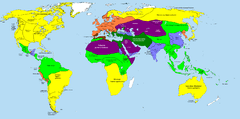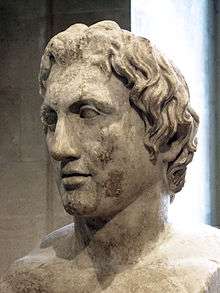4th century BC
| Millennium: | 1st millennium BC |
|---|---|
| Centuries: | |
| Decades: | 390s BC 380s BC 370s BC 360s BC 350s BC 340s BC 330s BC 320s BC 310s BC 300s BC |
| Categories: | Births – Deaths Establishments – Disestablishments |
The 4th century BC started the first day of 400 BC and ended the last day of 301 BC. It is considered part of the Classical era, epoch, or historical period.

This century marked the height of Classical Greek civilization in all of its aspects. By the year 400 Greek philosophy, art, literature and architecture had spread far and wide, with the numerous independent Greek colonies that had sprung up throughout the lands of the eastern Mediterranean.
Arguably the most important series of political events in this period were the conquests of Alexander, bringing about the collapse of the once formidable Persian Empire and spreading Greek culture far into the east. Alexander dreamed of an east/west union, but when his short life ended, his vast empire was plunged into civil war as his generals each carved out their own separate kingdoms. Thus began the Hellenistic age, a period characterized by a more absolute approach to rule, with Greek kings taking on royal trappings and setting up hereditary successions. While a degree of democracy still existed in some of the remaining independent Greek cities, many scholars see this age as marking the end of classical Greece.
In India, the Mauryan Empire was founded in 322 BC by Chandragupta Maurya, who had overthrown the Nanda Dynasty and rapidly expanded his power westwards across central and western India, taking advantage of the disruptions of local powers in the wake of the withdrawal westward by the armies of Alexander.
China in the 4th century BC entered an era of constant warfare known as the Warring States period. The period saw the rapid rise of large states (such as Chu) over smaller ones thanks to technological advancement. Though the period has usually been characterized by historians as being excessively violent compared to the Spring and Autumn period it was also punctured by several cultural and social growth through the expansion of several different sects of Confucianism and Taoism.
Inventions, discoveries, introductions
- Oldest Brāhmī script dates from this period. Brāhmī is the ancestor of Brahmic scripts, used in much of India and Southeast Asia.
- Romans build their first aqueduct.
- Chinese use the handheld trigger crossbow for the first time.
- The first crossbow, the gastraphetes, is invented at Syracuse. (? pre-421 BC)
- Burnt brick first used in Greece.
- Donkey-powered mills first used in Greece.
- In Greece, Aristotle proposes the division of the known sciences.
- Torque with lion's-head terminals, from Susa (modern Shush, Iran) was made. It is now in Musée du Louvre, Paris.
- Daric, a coin first minted under Darius I of Persia is made. It is now kept in Heberden Coin Room, Ashmolean Museum, Oxford.
- Second half of the 4th century BC – Tomb II, so called Tomb of Philip II of Macedon, Vergina, Macedonia is made.
- Starting in the year 309 BC, the later Chinese historian Sima Qian (145 BC–90 BC) wrote that the Qin-employed engineer Bi Ling of the newly conquered State of Shu in Sichuan had the shoulder of a mountain cut through, making the 'Separated Hill' that abated the Mo River, and excavated two canals in the plain of Chengdu. The significance of this was phenomenal, as it allowed the new Guanxian irrigation system to populate an area of some 40 by 50 miles (60 × 80 km) with over five million people, still in use today (Needham, Science and Civilization in China, Volume 4, Part 3, 288).
- The Chinese astronomer Gan De divides the celestial sphere into 365¼ degrees, and the tropical year into 365¼ days at a time when most astronomers used the Babylon division of the celestial sphere as 360 degrees (Deng, Yinke. [2005] (2005). Chinese Ancient Inventions. ISBN 7-5085-0837-8).
Significant people
- Agnodice, female Athenian physician and midwife
- Alexander the Great, king of Macedon
- Antigonus I Monophthalmus, Macedonian diadoch
- Antipater, Macedonian statesman
- Atropates, Persian nobleman
- Bessus, Persian satrap of Bactria
- Cassander, King of Macedon
- Chandragupta Maurya, Founder of the "Mauryan Dynasty"
- Craterus, Macedonian diadoch
- Darius III, king of the Achaemenid Empire
- Demetrius Poliocretes, King of Macedon
- Demosthenes, Athenian statesman and orator
- Dhana Nanda, last emperor of the Nanda dynasty
- Duke Xiao of Qin, ruler of Qin
- Epaminondas, Theban statesman
- Hephaestion, Macedonian general
- King Wuling of Zhao, ruler of Zhao
- Lysimachus, Macedonian diadoh and king of Thrace
- Mahapadma Nanda, founding emperor of the Nanda dynasty
- Manius Curius Dentatus, Roman statesman
- Nakhthorheb, last native Pharaoh of Egypt
- Pang Juan, Chinese general
- Parmenion, Macedonian general
- Pelopidas, Theban statesman
- Perdiccas, Macedonian diadoh
- Philip II, King of Macedon
- Ptolemy I Soter, Macedonian diadoh and king of Egypt
- Seleucus I Nicator, Macedonian diadoh and founder of the Seleucid Empire
- Shang Yang, Chinese statesman
- Su Qin, Chinese politician and strategist
- Tian Ji, Chinese general
- Zhang Yi, Chinese strategist
Visual arts
- Apelles, Greek painter
- Cephisodotus the Elder, Greek sculptor
- Leochares, Greek sculptor
- Lysippos, Greek sculptor
- Praxiteles, Greek sculptor
- Scopas, Greek sculptor and architect
Literature
- Menander, Greek playwright
- Onesicritus, Greek historical writer
- Qu Yuan, Chinese poet
- Simonides of Ceos, Greek lyric poet
- Xenophon, Greek historian and writer
Science and philosophy
- Anaximenes of Lampsacus, Greek rhetorician and historian.
- Antisthenes, Greek philosopher
- Archytas, Greek philosopher
- Aristippus, Greek philosopher
- Aristotle, Greek philosopher
- Callisthenes, Greek historian
- Chanakya, Indian economist and political advisor
- Crates of Thebes, Greek philosopher
- Demetrius of Phalerum, Greek orator
- Diogenes of Sinope, Greek philosopher
- Epicurus, Greek philosopher
- Mencius, Chinese philosopher
- Panini, Indian philosopher and writer
- Plato, Greek philosopher
- Pyrrho, Greek philosopher
- Speusippus, Greek philosopher
- Sun Bin, Chinese author & military strategist
- Theophrastus, Greek philosopher
- Wu Qi, Chinese military strategist & philosopher
- Xenocrates, Greek philosopher
- Zeno of Citium, Greek philosopher
- Zhuangzi, Chinese philosopher
Sovereign States
See: List of sovereign states in the 4th century BC.
External links
![]() Media related to 4th century BC at Wikimedia Commons
Media related to 4th century BC at Wikimedia Commons




